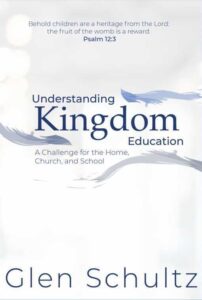 Ever since the Kingdom Education™ Summit, my life has been a whirlwind. The start of a new school year is always busy but not like it has been this year. By the time September rolls around, I will have been at six different Christian schools in six different states conducting 10 full days of professional staff development.
Ever since the Kingdom Education™ Summit, my life has been a whirlwind. The start of a new school year is always busy but not like it has been this year. By the time September rolls around, I will have been at six different Christian schools in six different states conducting 10 full days of professional staff development.
I have sensed a deep hunger for understanding and applying Kingdom Education™ like never before. Administrators and teachers want to fully understand Kingdom Education™. They want to know what Kingdom Education™ is from a biblical perspective and what needs to happen for a biblical philosophy of education to drive everything that takes place at their schools.
I am so thankful that all three books on Kingdom Education™ are now available. These three resources lay a biblical foundation for education, challenge the home, church and school to embrace Kingdom Education™, and provide application exercises to help apply Kingdom Education™ to everyday life in our homes, churches and schools. I encourage all parents, church leaders and educators to consider studying these resources. Click HERE to learn more about these resources.
Through all that has happened in these last two months, God has taught be an extremely important lesson. I have become more aware of the importance of the home when it comes to the education of children and youth. G.K. Chesterton once said,
The Family is not only an institution, but a foundation, the foundation of nearly all institutions.
As I have led Christian educators into a deeper understanding of Kingdom Education™, there seems to be both an excitement and worry when it comes to implementing a biblical philosophy of education. The excitement is because they know that Kingdom Education™ is necessary for them to fulfill God’s purpose for their calling to Christian education.
Of course, God’s purpose for Christian school educators is also His purpose for every parent, pastor and/or church leader. That purpose is what Jesus said right before He ascended into heaven. It is called the Great Commission.
And Jesus came and spoke to them, saying, “All authority has been given to Me in heaven and on earth. Go therefore and make disciples of all nations, baptizing them in the name of the Father and of the Son and of the Holy Spirit, teaching them to observe all things that I have commanded you; and lo, I am with you always, even to the end of the age.” Amen. Matthew 28:18-20 (NKJV)
Every Christian’s purpose is the same — we are to make disciples of all nations. Of course, this must begin in the home where parents see their most important task is the discipleship of their own children.
Even with this excitement of being involved in making disciples of the next generation, the teachers were anxious and wondered if this was actually possible. As we discussed this challenge, the condition of the home took center stage. Yes, there are many families where the parents are committed followers of Jesus Christ and believe that the discipleship of their children is of highest priority when it comes to how they educate their children.
However, the vast majority of parents who have enrolled their children in Christian schools, do so for a wide variety of reasons other than giving their children a biblical worldview education. Their main focus is preparing their children for college which is seen as a must if their children are going to be successful. Being successful is usually determined by their children’s economic achievements.
If and when leaders of a Christian school step up and make the discipleship of their students their number one goal, there is a fear that parents will think that the school is lowering its standards. If this happens, parents will no longer keep their children in these schools.
Yet, if we don’t get back to establishing Kingdom Education™ as the driving philosophy behind all we do, the result will be even more tragic. Students may continue to outperform their counterparts in secular schools but they will not become the disciples of Christ who can actually advance God’s kingdom in today’s world.
Something must take place right away. We must answer some very challenging but vital questions.
- How can we get parents to understand their God-given responsibility to provide their children with a biblical education at home, church and school?
- Who is going to disciple today’s parents?
- How can the church and Christian school equip parents so that they are able to educate their children biblically?
- How can school leader and teachers effectively partner with parents so that Kingdom Education™ becomes a reality in the home and school?
Alan Pugh addresses this need to better equip parents in his book Rethinking Discipleship: Why Christian Schooling. He writes,
When I hear pastors say, “Schooling/discipleship is the responsibility of parents,” my response is, “Of course, parents bear responsibility for discipling their children.” Who is responsible, however, for equipping parents for such a challenging role? Isn’t it a primary role of the church?
It has taken us many decades to get to where we are today. It is going to take time to turn this ship of education around. However, we must start today. I invite every reader to engage in conversation about how the church and/or the Christian school can engage and equip parents so that they will be committed to Kingdom Education™. Share your ideas by leaving a comment below.


 I am strongly opposed to any child being given a secular education. This is because there is an obvious danger to this type of education. However, I am more concerned with an insidious danger that comes with all secular education. In order to understand my concern and opposition to secular education, it is important to define terms accurately.
I am strongly opposed to any child being given a secular education. This is because there is an obvious danger to this type of education. However, I am more concerned with an insidious danger that comes with all secular education. In order to understand my concern and opposition to secular education, it is important to define terms accurately. Where did the summer go? It is hard to believe that a new school year is getting ready to start. Looking back over the past few months, I find myself amazed at all God did in my life and ministry. I am ready to move forward in my efforts to advance His kingdom.
Where did the summer go? It is hard to believe that a new school year is getting ready to start. Looking back over the past few months, I find myself amazed at all God did in my life and ministry. I am ready to move forward in my efforts to advance His kingdom. This will be my last post for a few weeks. I will be taking some time to get alone with the Lord and listen to what He has to say to me about the future. I have often found that taking time to be refreshed leads to being recharged and reignited about serving the Lord.
This will be my last post for a few weeks. I will be taking some time to get alone with the Lord and listen to what He has to say to me about the future. I have often found that taking time to be refreshed leads to being recharged and reignited about serving the Lord. My father was a very principled man. His life was marked by discipline and hard work. He lived such a life, even though he suffered from severe arthritis and psoriasis for most of his adult life. I cannot remember him being able to walk any long distance or do any type of physical exercise without experiencing great pain. However, I never heard him complain and, through all of these struggles, he exhibited an unbelievable work ethic.
My father was a very principled man. His life was marked by discipline and hard work. He lived such a life, even though he suffered from severe arthritis and psoriasis for most of his adult life. I cannot remember him being able to walk any long distance or do any type of physical exercise without experiencing great pain. However, I never heard him complain and, through all of these struggles, he exhibited an unbelievable work ethic.
 I have been asked this question a lot recently. In fact, I have asked myself this question quite often. Maybe you, too, have asked the question, Why? Consider the following forms of this question.
I have been asked this question a lot recently. In fact, I have asked myself this question quite often. Maybe you, too, have asked the question, Why? Consider the following forms of this question. For the past couple of weeks, I have been engaged in some interesting reading. Many ideas that I have come across through these readings have caused me to ask myself quite a few questions about life, in general, and specifically about education. Here is just a sample of what I have been studying during the last couple of weeks of May and the first few days of June.
For the past couple of weeks, I have been engaged in some interesting reading. Many ideas that I have come across through these readings have caused me to ask myself quite a few questions about life, in general, and specifically about education. Here is just a sample of what I have been studying during the last couple of weeks of May and the first few days of June. In my recent posts, I have been asking some important questions related to the education of future generations. As another school year comes to an end, we need to think about the important role that one’s philosophy of education plays in the education we give our children and grandchildren.
In my recent posts, I have been asking some important questions related to the education of future generations. As another school year comes to an end, we need to think about the important role that one’s philosophy of education plays in the education we give our children and grandchildren.
Recent Comments